FICO’s new mortgage pricing model shakes up the credit bureaus.
Plus, TransUnion links student loan stress to auto finance risk, while Mastercard expands into advertising and fintechs like Ramp, Imprint, and Worldpay push automation forward.
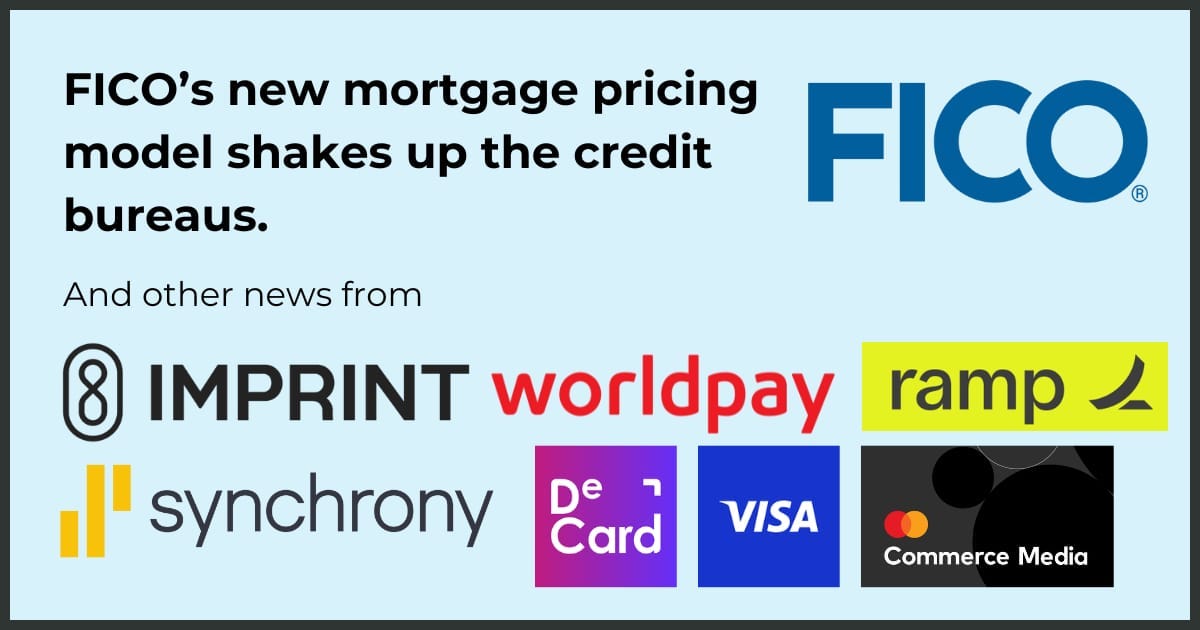
Hey Toaster Readers,
This week is sponsored by our friends at Fintel Connect.
It’s a week of shake-ups across credit, lending, and payments. FICO’s new direct-to-lender pricing is rattling the credit bureaus and could rewrite how mortgage scores are bought and sold. TransUnion’s latest report connects rising student loan delinquencies to early warning signs in auto finance, hinting at a possible reshuffle in how consumers prioritize payments as financial stress builds.
Elsewhere, fintechs are moving fast. Mastercard is also expanding its reach, launching a commerce media network for smarter ad targeting and extending near real-time cross-border payments to 22 new markets. Imprint Payments is planning its first asset-backed security sale, Worldpay rolled out an embedded finance engine for platforms, and Ramp introduced AI agents to fight invoice fraud. Synchrony’s acquisition of Versatile Credit strengthens its point-of-sale reach, while Visa and DeCard launched a premium Stablecoin card for Web3 users.
Let’s break down what’s happening.

FICO Rewires Mortgage Score Pricing, Putting Pressure on the Bureaus and Lender Workflows
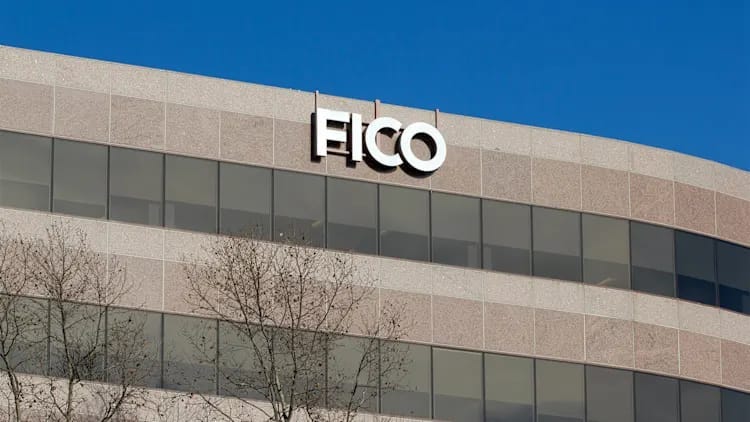
Image: Fast Company
FICO just gave mortgage lenders a new route to pull FICO Scores directly through tri-merge resellers, cutting the credit bureaus out of the resale chain and promising up to 50 percent savings on per-score fees. The new menu has two options: keep the legacy $10 per-score model or switch to $4.95 per score plus a $33 “funded loan” fee per borrower per bureau. The move aims at price transparency and choice, landing after months of regulator pressure to lower borrower costs. Markets got the message fast, as FICO shares jumped while Experian, Equifax, and TransUnion fell on fears that bureau markups on scores will shrink, with analysts projecting a potential 10 to 15 percent earnings hit for the bureaus if lenders adopt the new pricing.
Pushback was immediate. TransUnion called the change a price hike that could add roughly $99 per mortgage in closing fees and warned that implementation is uncertain in the near term. Lenders and resellers say the real impact depends on workflow changes across an industry slow to update legacy processes. For fintech marketers and product teams, this is a procurement and pricing story to watch, signaling new leverage in vendor negotiations, fresh messaging opportunities around “lower friction” and affordability, and a possible opening for VantageScore and alternative credit models to gain ground. [MarketScreener] [MarketScreener] [WSJ] [BusinessWire] [Fast Company]
TransUnion Connects Student-Loan Performance Concerns to Auto Finance
TransUnion has issued a new report connecting concerns over student loan performance to potential impacts on the auto finance market. The report revealed that millions of seriously delinquent federal student loan borrowers face the possible "resumption of involuntary collections" by the U.S. Department of Education, such as wage garnishment. When these borrowers were surveyed, they said they would prioritize paying their mortgage and auto loans first, but they would prioritize student loans ahead of credit cards and personal loans if involuntary collections started. TransUnion’s data from December 2024 to June 2025 supports this, showing secured products like auto loans had a "significantly lower increase in delinquencies" compared to unsecured personal loans and credit cards among seriously delinquent student loan borrowers. TransUnion noted that elevated inflation and the higher cost of living are forcing many to make difficult payment prioritization decisions, and the threat of involuntary collections could cause an "unprecedented shift in payment hierarchy." [SubPrime Auto Finance News]
Imprint Payments Plans Its First ABS Sale
Credit card startup Imprint Payments is making a big move: the company, which helps US retailers offer personalized customer rewards programs, plans its "first-ever asset backed security" sale. The firm wants to secure another funding stream after already landing bank facilities and a Series C round. Imprint Payments will back the securities with over 350,000 credit card receivable accounts, and early marketing for the offering could start "as soon as this week." This debt sale capitalizes on a sweet spot in the debt market, where borrowing costs for asset-backeds are near their lowest since 2022. Earlier this year, the New York-based firm "secured a $500 million credit facility" with three lenders, adding to a $300 million facility with Citigroup Inc. from late 2024. This new funding will help the venture-capital-backed company, which counts Thrive Capital Management LLC and Kleiner Perkins Caufield & Byers LLC as backers, drive further growth. [Bloomberg]
Worldpay Launches Embedded Lending, Banking and Card Issuing for Platforms Partners
Worldpay, an industry-leading payments technology and solutions company that processes over "50 billion transactions" annually across 174 countries, has launched its Embedded Finance Engine, an innovative new suite of financial products that helps its software platform partners quickly offer seamless business banking to their users. This engine, available to those integrated with Worldpay for Platforms, includes embedded lending, banking, and commercial card issuing, with "plans to expand capabilities rapidly." The pre-built, low-code financial components, which feature modern programming architecture, allow platforms to deliver these market-leading financial services directly from their existing applications "without requiring major investment or additional resources." Early adopter Inktavo, a software provider for branded merchandise makers, successfully integrated the embedded capital lending, funding "$14.2 million so far." Worldpay takes on the compliance and fraud risk, allowing partners to focus on their core business and enabling them to easily "turn on new services" as they become available. [Worldpay]
DeCard and Visa Launch DeCard Luminaries, a Premium Credit Card for Web3 Visionaries
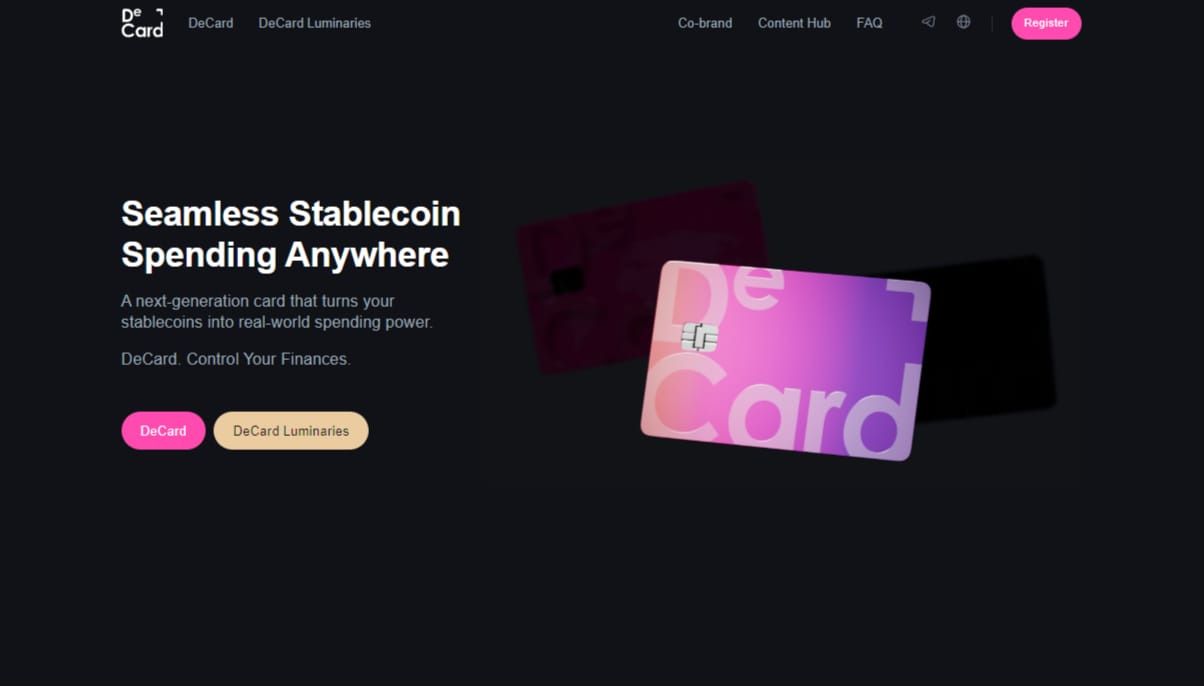
Source: DeCard
DeCard by DCS, a next-generation card brand for stablecoin spending, and Visa have launched DeCard Luminaries, a "premium Visa credit card" aimed at Web3 visionaries and C-Suite executives. This new card builds on the flagship DeCard product by allowing users to use their available stablecoin balance to fund everyday purchases at over "150 million Visa-accepting merchant locations" globally. The launch is well-timed, as the global stablecoin market has "more than doubled in size" over the past two years, hitting approximately "$255 billion" as of June 2025. This premium card offers a high spending limit, one of the most competitive FX rates, and up to "10% cashback," along with privileges like 24/7 Visa Concierge services and travel accident insurance coverage up to "$1 million." Visa stated they are "bridging the gap between traditional finance and digital currencies" by making stablecoins practical for everyday commerce. [Visa]
Powering Smarter and More Personal Advertising With Mastercard Commerce Media
Mastercard just launched its Mastercard Commerce Media network, a new digital media capability that uses the company's "permissioned data" to power smarter, personalized advertising across channels. The payments network, which processes over "160 billion-plus" transactions annually, already has a "significant reach to 500 million enrolled consumers" and 25,000 advertisers. This new commerce media network is proving highly effective, currently delivering a "proven up to 22-times return on ad spend (ROAS)" for advertisers by tailoring content using past purchase behavior and "real purchase signals." Mastercard solves the inconsistencies of current retail media with its unique end-to-end approach and proprietary card-linking technology, allowing advertisers to accurately attribute conversions for purchases made either in-store or online. Key relationships with Citi, WPP, and Microsoft will further expand the network's foundation and ecosystem. Essentially, Mastercard Commerce Media provides a valuable experience for consumers through relevant content, strengthens publisher engagement, and helps brands maximize their advertising impact. [Mastercard]
Synchrony Acquires Versatile Credit’s Credit Access Platform

Source: PYMNTS
Synchrony, a consumer finance company, has acquired Versatile Credit, a provider of consumer financing software. This deal gives Synchrony access to the Versatile platform, a point-of-sale solution that connects merchants, lenders, and consumers. Versatile Credit boasts "deep capabilities" in sectors like furniture, home improvement, and jewelry, linking customers of merchants and healthcare providers with lending options across multiple prime and non-prime lenders. Synchrony stated its plan to maintain Versatile's business strategy and management, enabling the platform to continue serving numerous other lenders and their partners. The acquisition should accelerate the technology roadmap for consumer financing solutions, while also allowing Synchrony to leverage Versatile's detailed reporting and back-end integration with merchant systems. Versatile CEO Ed O’Donnell noted that joining Synchrony will enable his company to bring its platform to even more merchants and consumers. [PYMNTS]
Corpay and Mastercard Move Extend Near Real-Time Payments to New Markets
Corpay and Mastercard are advancing the future of cross-border payments by expanding their long-running collaboration to deliver "near real-time payments" to 22 new markets across Asia, Europe, the Middle East, Africa, and Latin America. This significant move leverages Mastercard Move's extensive money movement capabilities, allowing Corpay's corporate, small business, and financial institution clients to seamlessly send faster, more secure, and transparent payments. With global cross-border payments projected to "exceed $250 trillion by 2027," the expanded reach empowers institutions to meet the growing demand for efficient transactions. This announcement builds on a strategic partnership established in April 2025, which named Corpay as the "exclusive provider" of large-ticket cross-border payment solutions for Mastercard's financial institution clients. The ultimate goal is to help companies of all sizes scale internationally, unlocking "new growth opportunities with unmatched speed, reach, and reliability." [Mastercard]
Subprime Consumer Resilience Tested as Earnings Season Approaches
As the third-quarter earnings season approaches, analysts are closely watching the performance of subprime consumers—defined as those with credit scores below 620—to see if their recent resilience will hold up under financial pressure. Despite facing credit card denial rates that are "2.3 times higher" than those for super-prime applicants, these borrowers are still determined to climb the financial ladder. For instance, PYMNTS Intelligence found that 21% of subprime consumers use credit cards for essential purchases specifically to try and raise their credit scores. However, a "series of small shocks in the world of consumer credit," like the recent collapse of subprime lender Tricolor Holdings, signal rising stress. As a result of being locked out of mainstream credit, 40% of subprime borrowers have turned to BNPL services, which often come with higher fees, leaving them more financially vulnerable. Analysts will scrutinize loan-loss provisions in the upcoming earnings reports to determine if rising delinquencies confirm a breaking point for this financially vulnerable group. [PYMNTS]
Fintech Ramp Launches Fraud Fighting, Bill Payment AI Agents
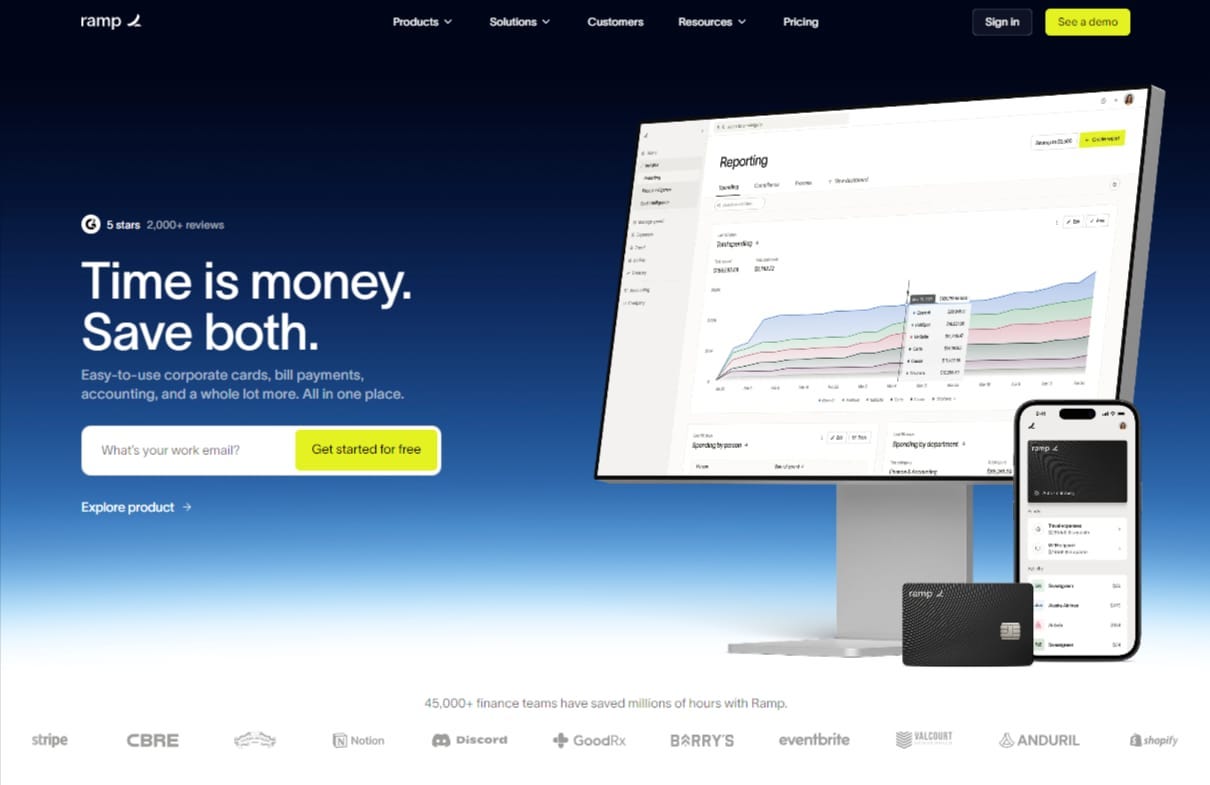
Source: Ramp
Ramp Inc., a spend management platform that recently raised funding at a $22.5 billion valuation, has launched new artificial intelligence agents to help its corporate customers fight the "growing problem" of invoice fraud, which has been spreading thanks to easily accessible generative AI tools. These AI agents, which evaluate 63 pieces of data including payment history and vendor details, work to flag fraudulent invoices designed to trick businesses into depositing money into a fraudster's account. Over a 90-day pilot period with "tens of customers," Ramp's accounts payable agents successfully flagged "$1 million worth of fraudulent invoices," all of which were subsequently left unpaid after human review. For example, one case caught a fraudulent invoice for about "$50,000." By autonomously automating tasks like confirming bank details and coding expenses, the agents also aim to speed up manual processes in accounts payable, a major time-waster for businesses. [Bloomberg]
Latest from The Podcast
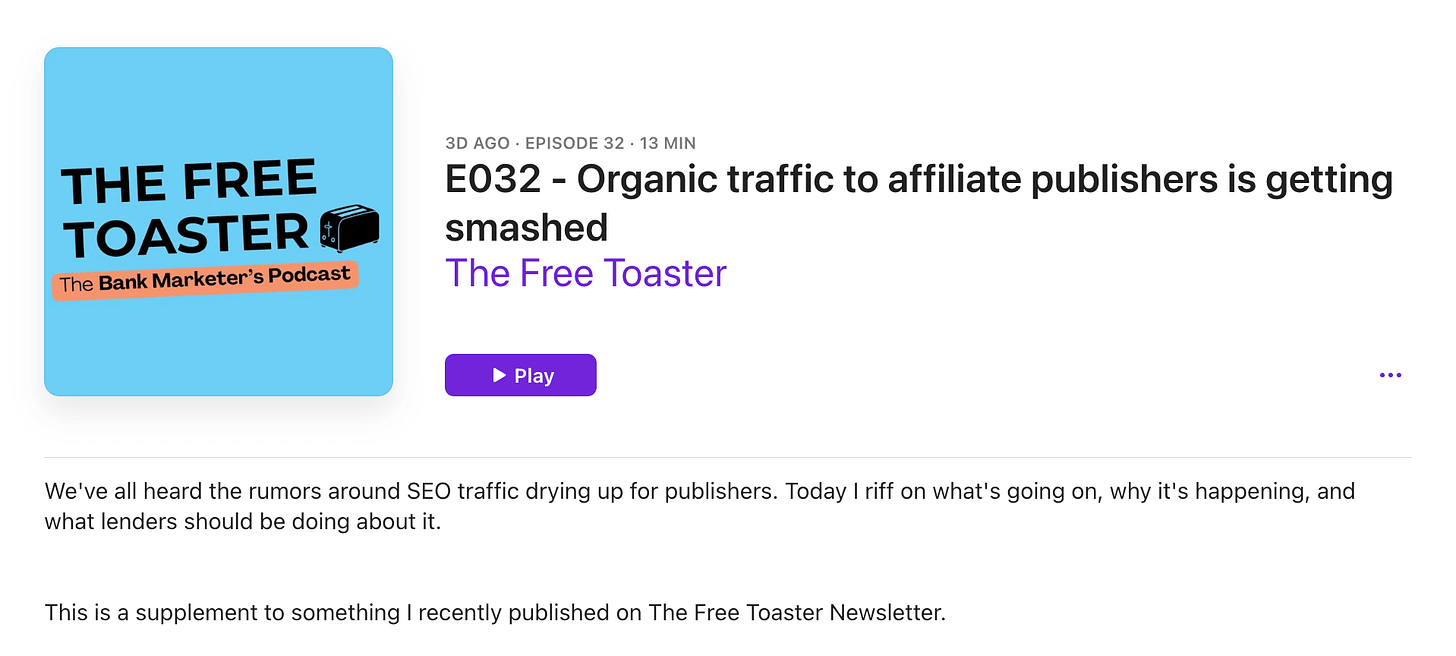
E032 - Organic traffic to affiliate publishers is getting smashed
Looking for your next fintech role?
Stay ahead of where the industry is hiring. The Free Toaster Jobs newsletter curates standout openings in fintech marketing, product, data, and risk each week, along with insights into the trends shaping hiring across leading lenders, neobanks, and fintech startups.
Subscribe to The Free Toaster Jobs to get the latest roles and hiring insights delivered straight to your inbox (Toaster subs that don’t opt-in won’t get the Friday jobs Edition).
Missed last week’s edition? Check out the most recent job listings here.
Other News We’re Reading
(Fraud) Credit Card Fraud Escalates As Fraud Continues to Be a Concern for Canadians [GlobeNewswire]
(Credit Scores) Credit score shake-up slams Chicago's TransUnion [Crain's Chicago Business]
(Mobile Banking) Hanscom Federal Credit Union and Alkami Forge Strategic Partnership to Power a Differentiated Mobile Banking Experience [Alkami]
(Credit Union) Cardinal Credit Union announces young investors stocks rewards program [Yahoo Finance]
(AI/Fintech) Fiserv Launches Content Next to Accelerate AI-Driven Content Management and Workflow Optimization for Financial Institutions [Fiserv Investor Relations]
(Marketing) New TransUnion and MMA Global Whitepaper Reveals Brand Building is Undervalued by Up to 83% [TransUnion]
(Lending) Pasadena-Based Scratch Financial Partners With LoanPro to Modernize Veterinary Lending [Pasadena Now]
(Investing) Sofi Stock Rises. What Trump’s Changes to Student Loans Could Mean for the Fintech. [Barron's]
(Lending) Baltimore sues MoneyLion over alleged predatory loan practices [CBS News]
(Payments) Zoho Expands into Digital Payments with Launch of POS Devices [FinTech Weekly]
(AI/Fintech) Bud Financial Launches MCP Server to Accelerate AI Agents with Bank-Grade Financial Intelligence [Financial IT]
(Investing) Klarna Stock Gets First Ratings After IPO. A Lot of Analysts Say It’s a Buy. [Barron's]
(Insurance) Nearmap, Zurich advance property underwriting with AI integration [Zurich North America]
(Payments) Brex Announces Launch of Stablecoin Payments [Brex]

Need an affiliate marketing platform/network? Chat with Fintel Connect
Need to improve application page conversions? Chat with Spinwheel
Need to accelerate your affiliate marketing? Chat with New Market Growth
Need to win on other growth channels? Chat with FIAT Growth
None of the above? Share our Newsletter in your favorite Slack channel

About Us
Welcome to The Free Toaster! The newsletter for marketing pros at fintechs, banks, and lenders.
Inspired by the free toasters banks used to give to each new customer, we’re here to help you acquire more customers at scale. We deliver fresh news, data, and insights to help you acquire more customers, minus the breadcrumbs.
Want to follow the authors on social media?
Carlos Caro is the founder of NMG, an agency that helps lenders build affiliate programs.
Nick Madrid is the co-founder of Uncovered Media and a co-founder of Ghostmode (a media company that builds Newsletters, Podcasts, and communities in high-value B2B niches).

